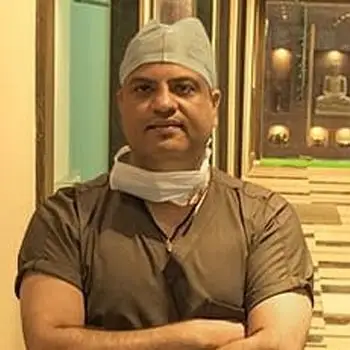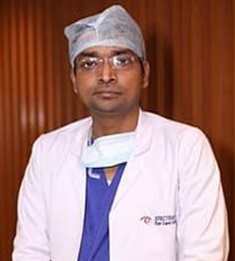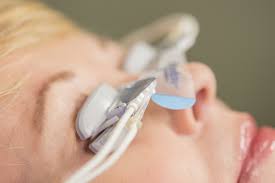CORNEAL AND OCULAR SURFACE PROCEDURES-Lipi Flow - Single Eye
India
-
Our Price USD 1047
-
Hospital Price USD 1102
-
You Save : USD 55
Booking Amount: USD 105. Pay Remaining 90% at the hospital.
Book NowAdditional Credit
Among the important extras we offer as part of the Additional Credit are the following:
-
Site Tourism For The Patient & Attendant
-
Airport Pick & Drop Service
-
Ambulance service at airport
-
Priority appointments with The Doctor
-
Cancel Easily Anytime with Full Refund
-
Room Upgradation
-
Free Online Doctor Consultation Valued at USD 20
-
Free hotel Stay for 5 to 7 days Accordingly
-
Welcome Kit at Arrival
-
Interpreter
-
Medical Visa Assistance
What is Included?
- Doctor consultation charges
- Lab tests and diagnostic charges
- Room charges inside hospital during the procedure
- Surgeon Fee
- Cost of implant
- Nursing charges
- Hospital surgery suite charges
- Anesthesia charges
- Routine medicines and routine consumables (bandages, dressings etc.)
- Food and Beverages inside hospital stay for patient and one attendant.
What is not Included?
- Extra Radiology Investigations
- Healthcare Professionals Charges of other consultations.
- Other Requested Services such as Laundry etc.
- Additional Pharmaceutical Products and Medicines After Discharge from Hospital.
- Management of Conditions Unrelated to Procedures or Pre-Existing.
- The cost of any additional implants will be in addition to the package cost.
Package Description
CORNEAL AND OCULAR SURFACE PROCEDURES-Lipi Flow:
LipiFlow is an FDA-approved therapy for dry eye caused by Meibomian gland dysfunction (MGD). MGD is treated with LipiFlow, which warms and massages the inside of the eyelids, restoring healthy oil production and improving tear quality.
LipiFlow is a painless and safe technique, however it can cause complications in certain people. Redness, minor burning or stinging, impaired vision, light sensitivity, and dryness are all possible side effects. These adverse effects are extremely infrequent and do not last.
The effectiveness of a single LipiFlow therapy varies from patient to patient, however it usually lasts 6 months to a year. Because dry eye is a chronic condition, it necessitates ongoing therapy to keep it under control.
Disease Overview:
dry eye disease
Dry eye illness is a frequent problem that arises when your tears aren't able to keep your eyes lubricated enough. Tears may be insufficient and unstable for a variety of causes. Dry eyes might develop if you don't generate enough tears or if the tears you do produce are of low quality.
Disease Signs and Symptoms:
- stinging, burning, or scratchy feeling in eyes.
- Mucus in or around the eyes that is stringy.
- Light sensitivity.
- Redness in the eyes.
- It's as though there's something in your eyes.
- Contact lenses are difficult to wear.
- Driving at night is difficult.
- The body's response to the discomfort of dry eyes is watery eyes.
Disease Causes:
Dry eyes can be caused by issues with any of these layers. Hormonal changes, autoimmune illness, irritated eyelid glands, and allergic eye disease are all possible causes of tear film malfunction. Dry eyes can be caused by reduced tear production or increased tear evaporation in certain persons.
Disease Diagnosis:
The following tests and procedures may be done to establish the reason of your dry eyes:
A thorough eye examination. Your doctor can determine the reason of your dry eyes with an eye exam that includes a full history of your overall health as well as your eye health.
A test to determine the amount of tears you shed. The Schirmer test can be used by your doctor to assess your tear production. Under your lower eyelids, blotting strips of paper are inserted in this test. Your doctor will measure the amount of strip soaked by your tears after five minutes.
The phenol red thread test is another method for determining tear volume. A thread loaded with pH-sensitive dye (tears change the dye colour) is put across the lower eyelid, wetted with tears for 15 seconds, and tear volume is then quantified.
This is a test to see how good your tears are. Other tests utilise eyedrops containing specific dyes to measure the state of your eyes' surface. Your doctor will examine your corneas for staining patterns and time how long it takes for your tears to dissipate.
An osmolarity test of the tears. This test determines the particle and water makeup of your tears. There will be less water in your eyes if you have dry eye illness.
Disease Treatment:
Most persons with infrequent or mild dry eye symptoms may get by with using over-the-counter eyedrops on a daily basis (artificial tears). You have additional options if your symptoms are persistent and significant. What you do will be determined on the cause of your dry eyes.
Some therapies aim to cure or manage the ailment or issue that is causing your dry eyes. Other therapies can enhance the quality of your tears or prevent them from emptying too fast from your eyes.
The underlying cause of dry eyes must be addressed.
In certain circumstances, fixing an underlying health problem might help alleviate dry eye symptoms. If a medicine causes dry eyes, for example, your doctor may prescribe an alternative prescription that doesn't have that adverse effect.
Your doctor may send you to an eye surgeon who specialises in eyelid plastic surgery if you have an eyelid issue such as your lids turning outwards (ectropion) (oculoplastic surgeon).
Medications
The following prescription drugs are used to treat dry eyes:
Anti-inflammatory drugs for the eyelids. Oil glands can't secrete oil into your tears if they're inflamed around the border of your eyelids. Antibiotics may be prescribed by your doctor to help decrease inflammation. Antibiotics for dry eyes are often taken by mouth, although some are also available as eyedrops or ointments.
Controlling corneal irritation using eyedrops. Prescription eyedrops containing the immune-suppressing medicine cyclosporine (Restasis) or corticosteroids can help manage inflammation on the surface of your eyes (cornea). Because of its side effects, corticosteroids are not recommended for long-term usage.
Eye implants that mimic the effects of artificial tears. If artificial tears don't help and you have moderate to severe dry eye symptoms, another alternative is a small eye implant that appears like a transparent grain of rice. The hydroxypropyl cellulose (Lacrisert) insert is placed between your lower eyelid and your eyeball once a day. The insert progressively dissolves, producing a lubricant similar to that found in eyedrops.
Drugs that cause tears to flow freely. Cholinergic drugs (pilocarpine, cevimeline) aid in the formation of tears. These medications can be taken as tablets, gels, or eyedrops. Sweating is one of the possible adverse effects.
Your own blood is used to make eyedrops. Autologous blood serum drops are what they're called. If you have severe dry eye problems that haven't responded to previous treatments, they might be an alternative. A sample of your blood is processed to separate the red blood cells and then combined with a salt solution to generate these eyedrops.
Information related to Treatment
Package Details
Days in Hospital
1 Days
Days in Hotel
*
3 Days
Room Type
Private

Treating Doctor
Dr. Suraj Munjal
Ophthalmologist- Retina Surgeon, Cataract Surgeon, Lasik surgeon, Vitreo Retina Surgeon, Eyelid Surgery, Trabeculectomy, Vitreoretinal Surgery, Orbital & Oculoplastic surgery, Refractive surgery, Retina Examination, Glaucoma Evaluation / Treatment, Canaloplasty, Corneal Surgery, Eye Muscle Surgery, Orbital Surgery, Anterior Segment Surgery, Orbital Decompression Surgery for Thyroid Eye Disease, Orbital Trauma, Diabetic Retinopahy, YAG laser Posterior Capsulotomy, Anterior Retinal Cryotherapy, Retinal Surgery, Lens for Keratoconus
The Sight Avenue Eye Hospital Delhi, India
19 Years of Experience

Treating Doctor
Dr. Md. Ali Mosharraf
Ophthalmologist- Cataract Surgeon, Lasik surgeon, Glaucoma Specialist, Ocular Oncology, Cataract treatment, Eye Checkup - General, Phakic OIL Implantation, Cornea Transplant, Treatment for Keratoconus
The Sight Avenue Eye Hospital Delhi, India
19 Years of Experience

Treating Doctor
Dr. Vidya Nair Chaudhry
Ophthalmologist- Squint Surgeon, Paediatric Otorhinolaryngology, Oculoplasty, Comprehensive ophthalmology, Comprehensive ophthalmology, Glaucoma and retina
Aakash Healthcare Super Speciality Hospital New Delhi, India
18 Years of Experience


